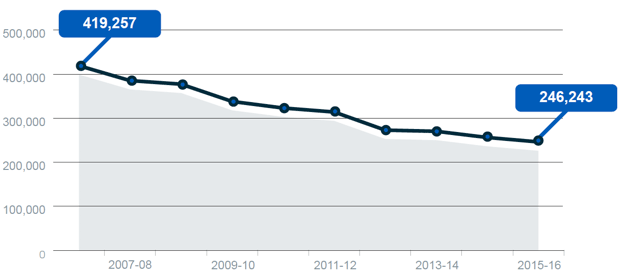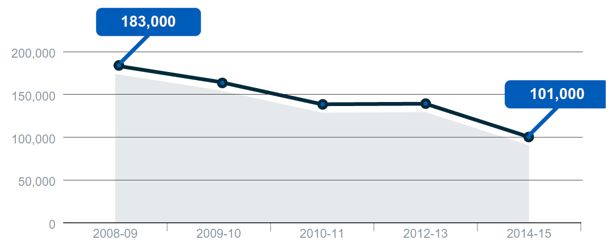Justice in Scotland: vision and priorities
Document setting out Scottish Government's plan for a just, safe and resilient Scotland, with established priorities for 2017 to 2020.
An Improving Picture
Scotland has become a safer place. Overall levels of crime and victimisation have fallen. We are less likely to be a victim of violence or property crime, or to be injured, or die, as a result of a fire. The number of people experiencing crime had either held stable or reduced across all crime types measured in Scotland to 2014-15.
People also feel safer in their communities, with fear of crime continuing to decrease. People are worrying less about most types of crime and are feeling safer when walking alone after dark in their local area.
Recorded crimes of handling offensive weapons are the lowest in 32 years. The number of people under 18 convicted of handling an offensive weapon has fallen by 81% since 2006-07. There has been a 59% fall in emergency admis-sions to hospital due to assault with a sharp object between 2006-07 and 2015-16. Action has been taken to reduce and prevent violence including through the Violence Reduction Unit, Mentors in Violence Programme, Medics Against Violence and No Knives Better Lives Programme.
Number of crimes recorded by the police: 41 %
Police Recorded Crime has fallen 41% since 2006-07

95 % of people rate their neighbourhood as a very or fairly good place to live
There has also been a downward trend in alcohol-related crimes, with population survey data showing a 45% reduction over the last six years. This may be associated with corresponding changes in the ways in which alcohol is consumed. There has been a reduction in the number of units consumed and an increase in the number of non-drinking adults. Evidence also shows a long term decrease in alcohol use among younger people. Nonetheless, in 2014-15 over half of violent crime was reported to be alcohol related.
Estimate of alcohol related violent crimes:
45% is the reduction in alcohol related violent crimes over 6 years

Drug use amongst the general adult population in Scotland has also continued to fall over the last few years for both males and females. There has also been a decrease in those reporting that someone has offered to give or sell them at least one type of illicit drug. Further, drug taking amongst young people has generally been declining since 2002.
The majority of people feel their communities are a good place to live and the vast majority feel they could ask for help from, or would offer help to, their neighbours in case of an emergency. The percentage of people saying that vandalism/graffiti/damage to property is very or fairly common in their neighbourhood has halved since 2006. There has been a similar reduction in the percentage of people who say that groups or individuals harassing others is very or fairly common.
74 % would help their neighbours in an emergency
63 % thought their neighbours would help them in an emergency
74 % of people felt safe walking home alone after dark
Overall levels of offending have also fallen and the criminal justice system has become more effective at bringing perpetrators to justice. Clear-up rates have been rising since 2006-07. This is particularly the case for serious violent crime, where the police clear-up rate has increased substantially.
While often a hidden crime, domestic abuse remains prevalent - 14% of adults report having experienced physical or psychological partner abuse since age 16. The number of people convicted of an offence with a domestic abuse marker has more than doubled since 2006-07. The Scottish approach to tackling the domestic abuse of women by men is framed by the 'Equally Safe' strategy.
Further, an evaluation of the Caledonian System, set up to address men's domestic abuse, shows that women feel safer and that men who complete the programme pose a lower risk to partners, children and others on completion. Scottish Government funding for advocacy services for victims of violence against women and girls is at record levels.
Scotland has maintained wide access to legal aid for both criminal and civil justice matters, with those who are eligible able to access public funding for legal representation and advice. Major reforms and modernisation have been implemented to Scotland's courts following Lord Gill's independent Civil Courts Review, including the establishment of a Civil Justice Council for Scotland; a new national Sheriff Appeal Court and Personal Injury Court; the creation of summary sheriffs as a new judicial office and modernisation of civil court procedures; to improve efficiency and ensure they are fit for the 21st Century.
Civil disputes can be a source of stress and anxiety but research suggests many people are unsure how to resolve problems with, for example, neighbours, housing debt and family. The Economic Downturn Programme established in 2012 by the Scottish Legal Aid board has been funding services that provide assistance and representation for people facing court action around repossession and underlying debt issues and providing advice to people with small claims enabling them to resolve matters pre-action or settle them early.
Scotland has a modern arbitration regime for dealing with both domestic and international arbitration. The work of tribunals and administrative justice are essential elements of the justice system. The Tribunals (Scotland) Act 2014 created a First-tier Tribunal for Scotland and an Upper Tribunal for Scotland, known collectively as the Scottish Tribunals. This modernised structure will ensure that all parties continue to be dealt with equally, with cases treated proportionately and expeditiously, delivering decision making of high quality.
The " Whole Systems Approach" to Youth Justice is based on prevention, early intervention and support. There is a strong focus on a multidisciplinary approach to keeping young people out of the criminal justice system and minimising statutory intervention. This approach, which followed a bold shift to prevention in 2008 and continues through the youth justice strategy Preventing Offending: Getting It Right for Children and Young People (2015), has contributed to a fall of 78% in the number of under 18 year olds being prosecuted in court since 2006-07.
Offence referrals to the Children's Reporter have decreased substantially as more young people are diverted from prosecution and kept out of the justice system.
We know that effective, person-centred interventions and effective supervision with support are key to addressing the underlying causes of reoffending for the adult population too. Evaluation of the mentoring approach and services provided through the Reducing Reoffending Change Fund shows that mentoring, when combined with other support, is an effective approach which helps mentees to learn and implement constructive, non-criminal ways of addressing problems in their lives and to reduce risk factors associated with offending behaviour.
Whole Systems Approach - Successful in keeping young people out of the criminal justice system
78% - number of under 18's prosecuted in court has fallen
Proportion of people on Community Payback Orders who are reconvicted
3 in 10 of those given a community payback order
72 % think those who are accused of crimes are treated as innocent until proven guilty
58 % think the local police are doing a good or excellent job
Evidence has demonstrated that community sentences are more effective at reducing reoffending than short prison sentences, as these interventions provide better opportunities to address the underlying causes of offending. This underpins our on-going approach to making more effective use of robust community sentences to reduce reoffending.
We know that in the decade up to 2012 the rate of female imprisonment rose faster than for men, with many women experiencing multiple disadvantage. The Commission on Women Offenders drew strongly on the available evidence in developing its recommendations to improve outcomes for women in the criminal justice system and reduce their reoffending. An independent evaluation of women's community justice services funded by the Scottish Government found the majority (83%) of women experienced improvements in at least one outcome.
Public confidence in the system is relatively high. In 2014-15, the majority of adults in Scotland said the police in their local area were doing a good or excellent job. Around three quarters of adults were either very or fairly confident that the system allows all those accused of crimes to get a fair trial, makes sure everyone has access to the criminal justice system if they need it and thought that it treats those accused of crime as innocent until proven guilty.
Police Scotland and the Scottish Fire and Rescue Service ( SFRS) became operational in 2013 following the passing of the Police and Fire Reform (Scotland) Act in 2012. Challenges remain, but early evaluation of this large scale public service reform found evidence of the establishment and functioning of new processes, structures, projects and programmes designed to enhance efficiency, effectiveness and engagement with communities.
Contact
Email: Justice Analysts, Justice_Analysts@gov.scot
Phone: 0300 244 4000 – Central Enquiry Unit
The Scottish Government
St Andrew's House
Regent Road
Edinburgh
EH1 3DG
There is a problem
Thanks for your feedback